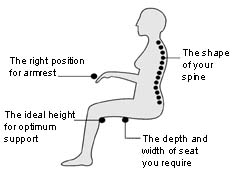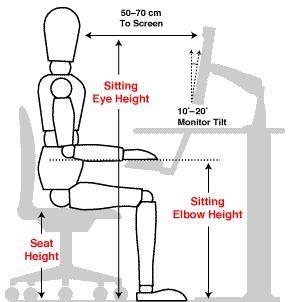As a university student, prolonged periods of time spent studying is unavoidable; however, the neck and back pain that can be experienced as a result of this, definitely is.
Whether studying at a desk, staring at a computer screen or hunching over textbooks cramming before an exam, it’s situations like these that every student becomes well acquainted with by the end of their first semester.
As if the stress and pressure caused by exams and assessment deadlines weren’t enough, many students also unwittingly subject themselves to bad posture habits which can lead to neck and back strain.
15 years ago Michael Roberts had to undergo brain surgery to resolve his epilepsy and this unfortunately resulted in the loss of motor function and symptomatic paralysis in his left leg.
Michael has to deal with pain on a regular basis, but since he commenced his studies his disability has become more problematic. In order to complete his course requirements Michael has no choice but to spend hours at a time sitting and studying at his desk.
In spite of regular physiotherapy session and adhering to recommended exercises, Michael’s disability still has a serious impact on his focus and concentration levels.
“It is painful, but I just deal with it. The study isn’t going to do itself,” Michael tells upstart.
“I have set exercises that I have to do to increase muscle mass and movement and soon I will be commencing a series of botox injections which allow for the building of muscles.” 
With 18 years of experience as a physiotherapist, Carmine Vinci tells upstart that the most common symptoms of neck and back strain include tightness, headaches, general pain and a feeling of fatigue and believes that workstation setup is critical for reducing stress on the body.
In order to reduce the potential for strain when sitting for extended periods it is vital to assume the correct posture, however, it is also crucial to use a suitable chair which provides adequate support.
Mr Vinci recommends that working posture should be arranged according to the desk (760mm is considered standard height) and ideally, using a chair that has an adjustable height, pelvic tilt seat, as well as lumbar support.
According to Mr Vinci, regular mobilisation is very important as a break from the posture, which is all that is required, noting that specific exercises or stretches aren’t as important.
“You would want to be doing that for maybe a minute or two every hour. It may just be getting up and stretching the legs or getting up and having a little walk around for thirty seconds.
“Unless there’s a particular injury that you’re trying to manage, in which case you would do more specific exercises,” says Mr Vinci.
Sally Martin is completing a Bachelor of Illustration at NMIT and experiences pain on a regular basis as a result of studying for long periods of time.
“I get stiffness in my neck, headaches, muscle spasms and lower back pain,” she tells upstart.
“I try to stretch and massage the source of the pain usually. If I am at home I use a heat pack too but if the pain becomes unbearable I have to use medication.
“I feel like if I wasn’t in so much pain that I could focus for longer and have better concentration when I study or do assignments,” she says.
Initially the importance of correct posture and mobilisation could easily be overlooked and for some people their poor posture habits, if perpetuated long enough, can result in a gradual degeneration of the spine, causing serious and long-term physical effects.
Whether you have a pre-existing physical condition or not, sitting for long hours while studying will always impact you physically, but poor posture is undeniably detrimental.
In order to minimise the negative physical effects of prolonged study it is essential to maintain correct posture, mobilise regularly and always seek professional advice if pain continues.
Stacey Elms-King is a third-year Media Student at La Trobe University and an editor for upstart. Follow her on Twitter: @SElmsKing







